I consider myself quite lucky to have been raised in a country that is so intricately affected by the politics of so many other countries. It has allowed me a knowledge of the world that I find so many people just don’t have.
My parents lived in the Turks and Caicos Islands (specifically the island of Providenciales) long before they had my sister and I (back when there were no paved roads and only one flight on and off the island each week) and they swear that they are going to spend the rest of their lives there too.
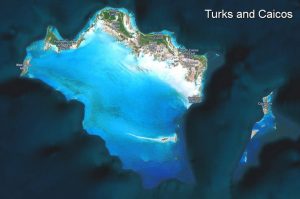
Turks and Caicos is an incredibly interesting and diverse country. It is made up of just over 40 islands with almost 40,000 inhabitants spread across those islands. It is a British Overseas Territory (having been “discovered” by Christopher Columbus in 1492) meaning it abides by British laws. However, most of the tourists visit from the USA and Canada. Due to this, growing up we followed and were affected by British, US, and Canadian politics.
I was taught from a young age to appreciate the nature that came with living in the Turks and Caicos. Most weekends were spent at the beach snorkeling, freediving, sailing, and kiteboarding.
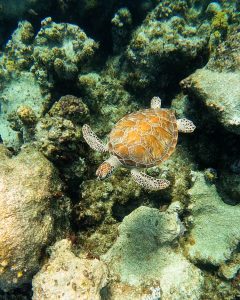
We would boat out to uninhabited islands and spend the day there. Paddleboard through the mangroves. Surf at Mudjin Harbour. While this was an amazing childhood, it means that I have witnessed the heart-wrenching decline of the health of our reefs and ocean life.
Turks and Caicos definitely hasn’t been hit as hard by overfishing and climate change as many other countries, but it has been hit nonetheless.
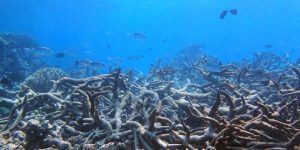
Within the past couple of years our reefs, like many others around the world, have been affected by the rising ocean temperatures. When the temperature of the water is even slightly warmer than normal (even just by 2 degrees) the coral begins to bleach in a last effort to avoid the heat. After bleaching, the coral dies. And in a couple of weeks, all that is left is a coral graveyard.
Furthermore, there has been a major decrease in the shark population in the Turks and Caicos and around the world. Sharks are incredibly necessary to keeping reefs healthy as they keep the ecosystem balanced.
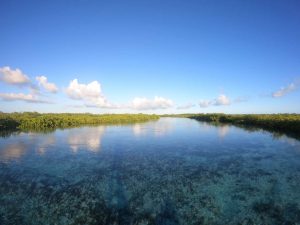
My favorite place in the whole world is in the mangroves just off the coast of Providenciales. Mangroves are small tree-type shrubs that grow in the shallow, marshy ocean water just off of the east coast of the island.
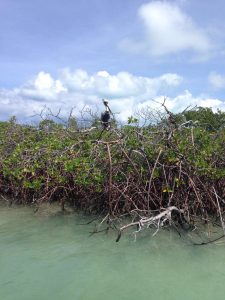
Mangroves are particularly entrancing to me because the shallow waters provide a nursery for young sea life. This means that when you paddleboard through the mangroves you are practically guaranteed to see juvenile fish, turtles, birds, Cassiopea jellyfish and shark pups. However, in the past year or so the number of shark pups that can be seen has dropped dramatically.
Cassiopea jellyfish are really interesting. They live upside down on the sand and have a symbiotic relationship with
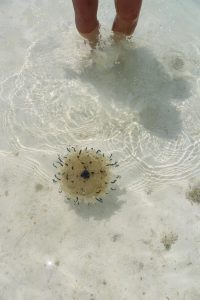
the algae that grows on their tentacles. When the algae photosynthesis the jellyfish take some of the energy as their food. Due to this relationship, they have an incredibly minimal sting (almost none existent). They come in a range of colours and look kind of like flowers!
Sharks are my favorite animal. They are not the scary monsters that they are made out to be in movies. They are incredibly intelligent and sensitive. While you are swimming underwater they can sense your heartbeat and move in time with it! They are super inquisitive and will swim up to you to check you out but are smart enough to know that you aren’t food.
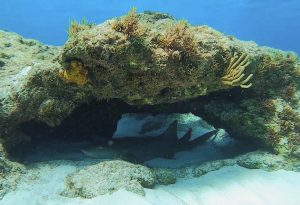
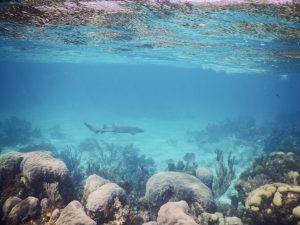
Due to shark finning (catching and killing sharks just to cut off their fins to eat them and throwing the rest of the body away) and sharks being caught as by-kill the shark population in the world has declined by upwards of 74%. This has had detrimental effects on the ocean ecosystem.
The Turks and Caicos is also home to many dolphins. The most well know is named JoJo (he even has an Instagram account that has over 72,000 followers). JoJo is special because he is so friendly. He will swim with humans and he loves to jump in the wake of boats. Another super friendly dolphin (named Baby Dream as he is still really young) can be easily found in the Turks and Caicos waters.
I think that whether we like it or not the places that we grow up affect us in many complicated ways. I know that growing in the Turks and Caicos Islands has largely made me into the person I am today and I feel that, as a writer, I would be doing a huge injustice to the country that I love to not incorporate it into my writing (even though this already happens unconsciously). Unfortunately, Turks and Caicos did get hit pretty hard by COVID-19. All flights on and off the islands got canceled which meant that many people and businesses struggled greatly as tourism is the main economy for the country. Many people my age who study abroad couldn’t go home this summer and going home for Christmas is going to be a difficult and complicated process.
I consider myself insanely lucky to have grown up in a country like the Turks and Caicos and I want to do anything I can to help protect the ocean life. However, the complexity that is involved with the death of coral reefs and the animals that consider them home makes it a difficult problem to wrap your head around. And, personally, I have very little hope that we will ever fix the damage that we have done. However, I believe that the first step towards change is education. After all, how can you care about something that you don’t know about? Below is a list of documentaries that you can check out to learn more about these horrific problems.
Chasing Coral
Sharkwater and Sharkwater Extinction
A Plastic Ocean
Mission Blue
My Octopus Teacher

Hey Dessa, this was a great read. It was really nice to see how your past has transformed into a passion for the oceans and ocean life. I’ve always been really passionate about the oceans too, but to grow up around them must be such a unique experience. I still remember when I first learned about coral bleaching and I felt so upset and helpless, I can’t imagine watching the oceans you grew around fall away like that. I really appreciate your documentary suggestions too; if anyone reads this, I especially recommend Mission Blue (Sylvia Earle is a badass). Thanks so much for sharing, Dessa.
I loved this! I learned so much about your upbringing, and how wildlife has really shaped your personality. I knew the shark population was declining, but I did NOT know the number was that high. It really gave me something to think about, thanks Dessa!
Hi Dessa, I really enjoyed reading this! I found it super informative and educational. You painted a great visualisation of your home country! With that, you continued to educate by leaving some documentaries to watch- nice touch! Thank you for sharing your work with us!
Super great post, Dessa. The pictures are beautiful, and the content is very insightful. Thank you for sharing this 🙂
Wow this was such a rollercoaster! The images from your childhood sound like paradise, and that made your next point about the destruction of nature all the more saddening. But you instilled hope in us by talking about the things that are still beautiful, and the things we perhaps can still change if we all come together and put up the effort. This was an epic read!
This makes me so sad. It is so crazy to think about how this magical place that you grew up in will probably look completely different by the time you are raising your own children (as it did for your parents). This is something that is so hard to think about, but it is necessary. When you mentioned the coral graveyard, I was already getting emotional and don’t even get me started on the sharks. I love sharks. On a brighter note, your upbringing sounds so incredible. What an amazing way to live. Thank you so much for sharing this with us.